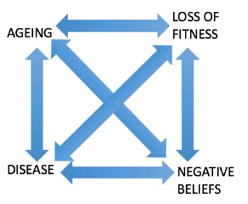There is strong scientific evidence that if we put into practice the knowledge that we already have, people can live longer better. Most of the serious problems that people face before their late nineties are not due to the normal, biological ageing process but to three other process that can be modified by individuals and society - loss of fitness, disease and negative, ageist thinking. Our library organises the evidence behind this and contains the knowledge that is needed to reduce the risk or disability, frailty, dementia and dependence on other people.
It is now known that what happens to us as we live longer should not just be assumed to be caused by ageing. There are three other inter-related causes of the problems that many associate with ageing. We can do something about these.
Ageing is a normal biological process which affects everyone from about forty on, but which by itself does not cause major problems until after ninety. The science is now much clearer that there are three inter-related causes of the problems that occur more frequently as people live longer:

- Loss of fitness, both physical and mental;
- Disease, much of which is preventable and that often results in disability which is complicated by accelerated loss of fitness; and
- Pessimistic and negative beliefs and attitudes.
These can be influenced by:
- Getting fitter by increasing three types of activity: physical, emotional and cognitive, enabling social connections as well as encouraging physical activity;
- Reducing the risk of dementia, disability, frailty and the need for long term care, including the effective prevention and management of disease and the accelerated loss of fitness that often follows the onset of disease;
- Understanding what is happening to you and around you so that you can be more positive and believe that action and engagement with others, particularly with a social purpose, can reduce the impact of what most people think is the effect of ageing.
The evidence is that healthy life expectancy, or health span, can be increased from this pattern

to this one

But what about those who are already affected by frailty, perhaps complicated by dementia, and with three years or less in front of them? Too many people spend their last three years like this

This is not due to ageing but to a combination of disease, some of which is preventable, loss of fitness and negative beliefs and attitudes. At any age, it is possible to aim for this instead:

This would result in a reduced need for acute health and social care, which could occur within months. This is particularly important because the effects of lockdown on physical and mental health will have an impact on health and social services this year.
The means of doing this are by promoting physical, cognitive and emotional activity. Although we obviously need to get people out of their homes more often, and about five million people have significant difficulty in leaving their homes, the internet allows us to support activity when people are on their own.
In addition to the traditional risk factors including midlife, smoking, diet and inactivity, people with limited mobility due to multi morbidity develop a new set of risk factors - lack of purpose, depression, isolation and loneliness. The evidence is that what is needed is for everyone to become more active and for:
- activity to be done in groups for increased emotional wellbeing;
- the groups to have a social purpose wherever possible, for example to raise money for charity or to promote tree planting to mitigate climate change;
- for the groups to compete with one another; and
- for the groups to encourage inter-generational learning.
The use of digital resources, including virtual reality, has a vitally important part to play.
